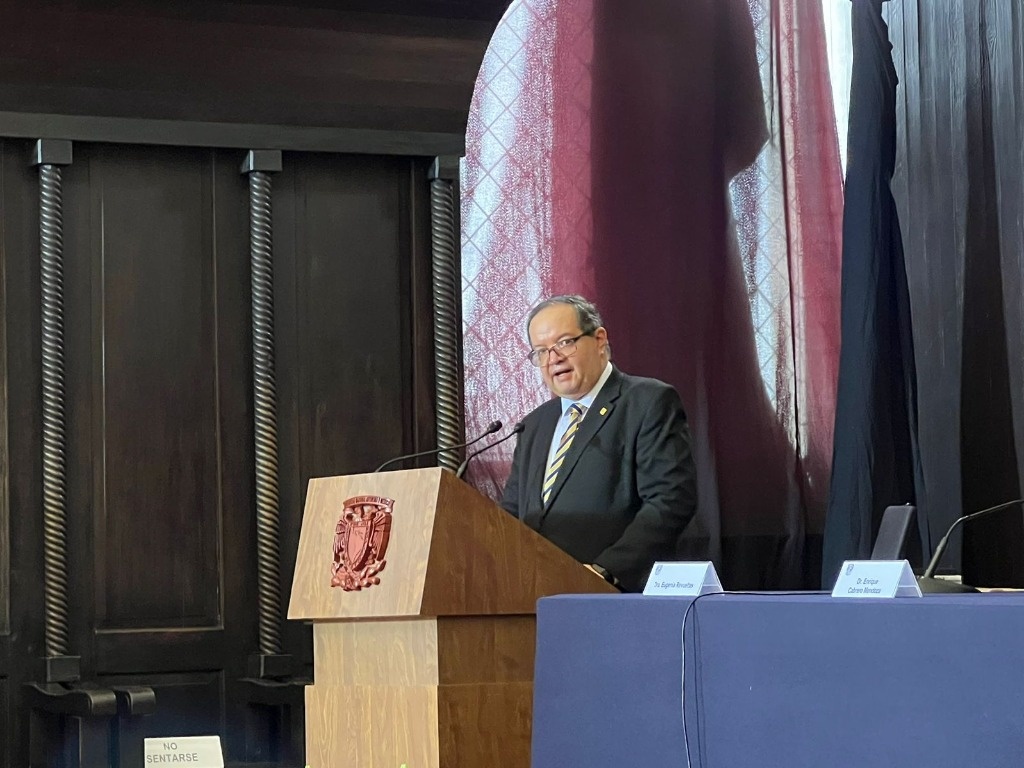CMexico City. The defense of university autonomy “is inseparable from the defense of democratic values. At many times in our history, UNAM has been a fortress of resistance against authoritarianism, always defending freedom of expression and the right to dissent,” said the rector of the highest house of studies, Leonardo Lomelí Vanegas.
During the solemn ceremony in which the motto UNAM, through my race the spirit will speak, was inscribed in gold letters on the Senate’s Wall of Honor, he thanked this distinction that, he said, involves society.
Those who inscribe these letters and our motto are the people of Mexico as a whole through its representatives, because the history of the University would be inconceivable without the will of millions of people who recognize that, without public, free and autonomous higher education, it would be even more complex, if not impossible, to build a better country.”
He added: “May this legacy of reflection, openness and resilience be a reminder that the spirit of UNAM will always speak and be at the service of Mexicans and of humanity.
“My spirit will speak through my race,” to the applause of the president of the Senate, Ana Lilia Rivera, the president of the Political Coordination Board of that chamber, Ricardo Monreal, and the former rectors of the University, Enrique Graue, Jose Narro, José Sarukhán, as well as emeritus professors and researchers, such as Annie Pardo Cemo, mother of the president-elect, Claudia Sheinbaum, directors of faculties and officials.
In his final interview, rector Lomelí Vanegas expressed absolute confidence that there will be a good relationship with the next president. “I think we will have a very good chance to contribute to the development of the country. There are many university students in Dr. Sheinbum’s cabinet. Of course, we are very excited to be able to contribute to making our country better.”
He rejected the idea that UNAM could be ideologized, as has been mentioned, and pointed out that although there was criticism in the government of Andrés Manuel López Obrador, autonomy was always respected and “I am sure that this will be the case with Dr. Sheinbaum.”
In his speech, he stressed that “the defence of university autonomy, a fundamental principle that, for 95 years, has guaranteed academic and research freedom, as well as the independence of the University from any type of political, ideological or economic intervention or interest.”
University autonomy, he stressed, “is its essence, which allows it to build and maintain spaces where critical thinking and plural debate can flourish without restrictions. Thanks to it, the University has resisted and overcome the structural and political challenges it has faced.”
Historically, he explained, “in the face of urgent and profound phenomena and crises, the University has demonstrated its capacity for adaptation and resilience.
In response, we have focused on critical and empathetic education, on scientific research with concrete applications, on promoting dialogue and on mobilizing resources and talent, always at the service of Mexico.”
In his speech he also referred to the role of UNAM not only as an academic institution. “It is also an active agent of social change. Through our outreach, outreach programs and headquarters abroad, we bring knowledge and culture to all corners of the country and to other latitudes.”
Rector Lomelí Vargas also referred to the challenges. He said that the increase in higher education enrollment, which went from 2 million students in 2000 to 5.3 million in 2023, is due to the increase. However, this growth is insufficient and highly unequal across federal entities, with current coverage of almost 44 percent.
“This means that, despite the great efforts made in recent decades, only a little more than four out of ten young people between 18 and 22 years old can attend university. It should also be noted that this coverage is significantly lower than the Latin American average, which is 56 percent.”
Similarly, “the gap in higher education coverage at the national level has widened in 17 states, being most significant in Oaxaca, Chiapas, Guerrero, Michoacán and Tlaxcala, which are below the national average. This situation is unacceptable and demands our joint and immediate action.”
This situation, he stressed, also invites us to reflect on the challenges that are on the horizon. Higher education in Mexico faces significant challenges, such as the need to allocate a sufficient budget, expand coverage, close gaps, improve educational quality and strengthen research. Solving them requires full awareness and shared responsibility from government authorities, the academic community and society as a whole.”
From the plenary session, the rector of UNAM recognized those who have left an indelible mark on the highest house of studies, among them Justo Sierra, José Vaconcelos, Gustavo Baz and Javier Barrio Sierra, the latter, who defended its autonomy in the most critical moments of our history.
She also acknowledged “all the university women, without whose contributions it would have been impossible to write and continue writing our history: from the first who had access to higher education, to the growing number of directors, students and officials in all fields.” Among them she placed the president-elect, Claudia Sheinbaum.
It was an emotional ceremony, in which Senators Rivera and Monreal highlighted the role of UNAM, as did Beatriz Paredes, from the PRI, who stressed that the University “is the mirror of the best possible Mexico,” the coordinator of the PRD, Miguel Angel Mancera, the Morena member Navor Rojas and Marcela Mora, who almost came to tears when recognizing the importance of the institution in her life.
They all ended their performances with the classic “Gooooya.”
#Rector #Lomelí #appreciates #coordination #respect #UNAM #Sheinbaum
– 2024-08-24 21:56:59
